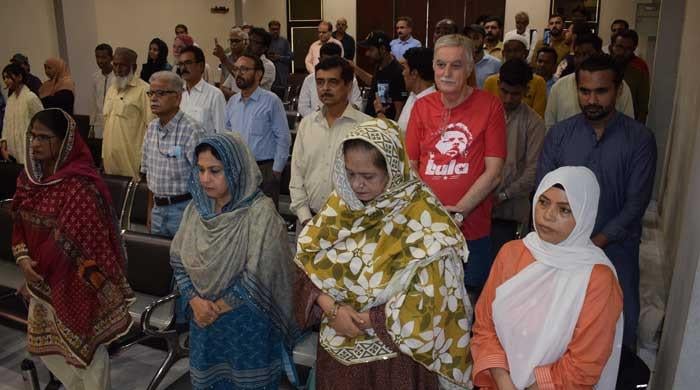Minimum Wage Implementation Failures Addressed at PILER Seminar
To mark International Labour Day, the Pakistan Institute of Labour Education and Research (PILER) convened a seminar on Wednesday, highlighting the critical issue of unfulfilled minimum wage laws in Pakistan. The discussion took place at the Karachi Press Club.
The event united trade union representatives, government figures, and international labour advocates to seek practical strategies for safeguarding worker entitlements amid an unstable economy. Abbas Haider, Joint Director of PILER, served as the moderator. The seminar was dedicated to the memory of Karamat Ali, the founding director of PILER, whose dedication to labour rights continues to fuel the organisation’s purpose and labour movements.
The seminar addressed the widespread failures leaving many Pakistani laborers without legally ensured fundamental wage protections, especially in light of rising inflation and currency depreciation, which has negatively impacted workers’ financial stability.
Employer Resistance and Insufficient Wages
Nasir Mansoor, representing workers on the Sindh Minimum Wage Board, started the discussions by pointing out the contradictions in employer conduct. Mansoor stated, “We have noticed the opposition from employers within the minimum wage board. They donate to charity but fail to provide their employees with equitable pay.” He stressed that Pakistan’s present minimum wage is progressively inadequate due to unchecked inflation and currency devaluation, leaving employees unable to cover essential needs.
Mansoor also critiqued the division of worker identity along racial, ethnic, and personal lines, stating that “90% of workers lack collective bargaining rights.” He urged a renewed focus on labour-based organizing: “You may cherish your race, ethnic identity, but you should remember that you are primarily workers.”
Challenges Faced by Contract Workers
Bushra Arain of the Sindh Lady Health Workers Union spoke about organizing contract workers despite substantial opposition. She stated, “A pharaoh is present in every decision-making role,” in reference to the authoritarian leadership style that employees encounter. Arain explained how her union’s cohesion enabled them to assert their rights, even when faced with imprisonment and physical abuse during demonstrations.
Legal Loopholes and Worker Compensation
Mirza Maqsood Ahmed from PILER clarified the technical aspects of minimum wage evasion, explaining how employers exploit legal language to lower worker compensation. “Employers argue that social security and EOBI deductions should be included in wages,” he said, noting that the majority of workers are never registered with these organizations. Ahmed emphasized that the absence of suitable worker categorization—skilled, semi-skilled, and unskilled—further allows companies to maintain artificially low wages while reducing gratuity and other benefits.
Erosion of Purchasing Power
Qamar-ul-Hasan, a veteran trade unionist, offered historical perspective on the significant decline in purchasing power. He stated, “In 2001, 2.5 months of minimum pay equaled one tola of gold. Currently, it takes 8.5 months of labor to purchase the same amount of gold.” Hasan emphasized that the existing official minimum wage of Rs. 37,000 is already insufficient, yet approximately 99% of Pakistan’s 800 million workers do not even receive this legally mandated minimum.
Government Acknowledgment of Enforcement Failures
Athar Shah, Director General of Shop Establishment, openly recognized the state’s failure to enforce regulations. “We are ashamed that, despite having this law, we are unable to implement the minimum wage,” Shah admitted. He stated that employees typically prefer positions with overtime opportunities since the minimum wage alone is insufficient to support their families.
International Perspectives and Strategies
Comrade Patrick of the Socialist Network in Brazil shared insights from his country’s experience under President Lula, providing a global viewpoint. Patrick described how Brazil effectively raised the minimum wage and linked it to inflation, protecting workers’ buying power. He noted, “Currently, the minimum wage in Brazil is 265 dollars, with no tax on minimum wage,” and added that “Pakistan is far worse than Brazil” in terms of worker protections.
Patrick advocated for modernizing union strategies through “social trade unionism,” which entails creating broader alliances between workers, consumers, and suppliers to exert greater pressure on employers. He suggested, “We need to use emerging digital tools to proliferate this narrative,” and proposed that social media could help reach previously unorganized sectors such as domestic workers and delivery personnel.
Labour rights advocate Habibuddin Junaidi recognized the substantial labour legislation enacted by the Pakistan Peoples Party administration in Sindh following the 18th Amendment, but he emphasized the ongoing implementation gap. He emphasized that security guards are among the most mistreated workers, frequently working 12-hour shifts for as little as Rs. 14,000 per month.
The seminar concluded with Mehnaz Rehman’s observation that “the difference between rich and poor is widening, and the government is doing nothing to address this gap.” She highlighted developing labour sectors not covered by conventional frameworks and urged unity among workers and the middle class to address rising inequality.



Comments (0)
No comments yet. Be the first to comment!
Leave a Comment